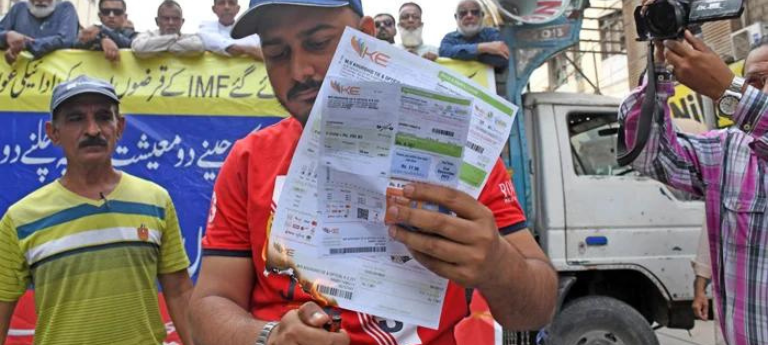- Development comes as protests intensify across country.
- Proposed cuts to be applied in bills across 6 winter months.
- Suggestions include 30% to 35% reduction in power bills.
Peshawar and ISLAMABAD: Top officials in the power and finance divisions have proposed recommendations on how to provide immediate relief to the public by suggesting deductions in the bills for August and September in response to widespread protests against the increase in electricity bills and additional taxes across the nation, according to The News.
The proposals will be discussed at the upcoming federal cabinet meeting, which is scheduled to take place today (Tuesday), before Caretaker Prime Minister Anwaar-Ul-Haq Kakar.
The change occurred as protests against rising prices on the streets in many regions of the nation by those affected by inflation.
The meeting’s specifics are unknown, but insiders told The News that one possible suggestion involves a partial reduction in electricity costs for the months of August and September, which would act as an initial measure of relief. To lessen the immediate burden on consumers, the proposed cuts would be applied to their bills over the course of six winter months in a staggered fashion.
Furthermore, the government has chosen not to immediately carry over to the following quarter the effects of the most recent quarterly adjustment tariff from FY23, which is currently Rs5.40 per unit. Instead, this increase will be spread out gradually over the six-month winter season, which runs from October 2023 to March 2024.
This gradual approach can lessen the abrupt price rise, which will lead to a drop in the tariff rate from Rs5.40 per unit to Rs2.31 per unit during the winter.
The impact of Rs1.24 per unit of the third quarter of FY23 would end in September 2023. In the winter season, electricity consumption goes down to just 10-12kMW, owing to which the electricity bills would tumble.
So the government has decided to pass some part of the inflated bills of August and September to consumers in six months of the winter season. However, there are some suggestions that 30% to 35% of the electricity bills should be reduced from the electricity bills, which would be passed on to consumers in the winter season in a staggered manner.
The finance ministry would need the IMF’s support in order to deduct general sales tax (GST), withholding tax (WHT), and surcharges from electricity bills. However, the official warned that the IMF might not approve of a compromise on the Rs9.2 trillion tax revenue generation target; as a result, there didn’t appear to be any relief in the form of a cut in the GST and WHT taxes.
The average power tariff has increased by Rs14 per unit, from Rs35 to Rs49 per unit, according to startling information obtained by the federal cabinet. This increase is the result of annual rebasing, which the government will begin collecting through electricity bills in August 2023.
The base tariff for the current fiscal year was set using an exchange rate of Rs 286 against the US dollar, as opposed to much less for the previous fiscal year, the Ministry of Power informed the cabinet. The government was forced to increase the Annual Rebasing (AR) tariff by Rs 7 per unit as a result.
Currently, the federal cabinet has two choices: either abolish the AR collection of Rs 14 per unit, collected through August 2023 electricity bills, or collect it in the form of a staggered manner.
The next six months of the current fiscal year will see the collection of Rs2 per unit. While the nation is enrolled in the International Monetary Fund (IMF) program, there is no chance of any tax relief, including GST and WHT.
The National Electric Power Regulatory Authority (Nepra) determined an AR tariff of Rs 7 per unit, but the previous government delayed its implementation until July 2023. This information was revealed by the cabinet after it underwent scrutiny. In July 2023, the Ministry of Power was unable to recoup the annual rebasing tariff of Rs7 per unit.
When the AR tariff went into effect in August 2023, the price of an electricity bill increased by Rs14 per unit all at once. With effect from August 2023, the average tariff has increased from Rs 35 to Rs 49 per unit, and this drastic increase in power prices has sparked outrage across the nation.
The official said that Pakistan’s power sector was witnessing the monster of capacity charges, which was standing around Rs18 per unit. The capacity charges turned from Rs1.3 to Rs1.6 trillion and there is a need to bring it down through utilisation of incremental package for industries. This average tariff on account of capacity payment needs to be brought down from Rs18 to Rs6 per unit in order to align it with the best international practices.
“Without tackling the capacity charges issues, the cash bleeding power sector cannot be fixed,” said the official.
When The News contacted the top brass in the power sector to inquire about the adoption of a conservation plan to decrease utilisation, they claimed that a conservation strategy would not help reduce capacity charges. To lower the capacity fees, a multifaceted approach is required, including a revision of the contracts with IPPs.
The Ministry of Power has so far reached revised agreements with a few IPPs, but the savings were only Rs0.85 per unit. There is a need to find amicable solutions on an ongoing basis because there are some power producers, such as power projects connected to the China-Pakistan Economic Corridor (CPEC) and some others, where there was no revision in tariffs.
SOURCE: GEO NEWS






